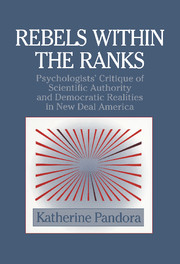 Rebels within the Ranks
Rebels within the Ranks Book contents
- Frontmatter
- Contents
- Acknowledgments
- Introduction
- 1 The Deep Context of Dissent: Jamesian Philosophy and Social Gospel Theology
- 2 Challenging the Rules of the Game
- 3 Defying the Law of Averages: Constructing a Science of Individuality
- 4 The Pursuit of “Impure” Science: Constructing a Science of Social Life
- 5 Natural History and Psychological Habitats
- 6 Exploratory Relativism and Patterns of Possibility
- Conclusions
- Notes
- Index
4 - The Pursuit of “Impure” Science: Constructing a Science of Social Life
Published online by Cambridge University Press: 06 October 2009
- Frontmatter
- Contents
- Acknowledgments
- Introduction
- 1 The Deep Context of Dissent: Jamesian Philosophy and Social Gospel Theology
- 2 Challenging the Rules of the Game
- 3 Defying the Law of Averages: Constructing a Science of Individuality
- 4 The Pursuit of “Impure” Science: Constructing a Science of Social Life
- 5 Natural History and Psychological Habitats
- 6 Exploratory Relativism and Patterns of Possibility
- Conclusions
- Notes
- Index
Summary
Pay no attention to the man behind the curtain!
The Wizard of Oz (1939)In elaborating the “social” half of the-individual-in-social-context construct, Allport and the Murphys sanctioned crossing beyond the confines of scientific propriety into the realm of “impure” science – “impure” that is, by the definition of scientists who sought to cleanse science of the taint of the social in their quest to obtain “pure” knowledge. As students of the “common public world of nature,” Allport and the Murphys, on the other hand, assumed that their endeavor was indeed a social enterprise, and that science was, as a result, shot through with moral and political values. As researchers, they believed that neither they nor their colleagues could – or should – sidestep confronting questions regarding the place of scientific elites in a democracy by hiding behind a veil of “objectivity.”
As Allport and the Murphys conceived it, one of their duties as social psychologists was to insist that the antidemocratic social structures of American life be identified and forthrightly examined – so as to discharge their public obligations as scientists working in a democracy, but also in order to chart the terrain in which they themselves, as scientists, labored. They fully expected that “impure” science, done properly, would be regarded as “dangerous” and “subversive” by those in positions of economic power, as Gardner Murphy maintained in his 1938 speech as chairman of the Society for the Psychological Study of Social Issues (SPSSI). Murphy's warning to psychologists that they must take responsibility to see that their “factual discoveries” were not placed in the service of the “exploitation of some by others” signaled the existence of a dissenting viewpoint that questioned the democratic pretensions of scientific practice.
- Type
- Chapter
- Information
- Rebels within the RanksPsychologists' Critique of Scientific Authority and Democratic Realities in New Deal America, pp. 90 - 118Publisher: Cambridge University PressPrint publication year: 1997


